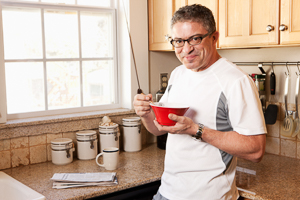Nutrition and Physical Activity
Topic Overview

Food provides energy for physical activity. As you get more active and more fit, and/or as you lose weight, your energy needs (how many calories you need) may change. To get the energy you require, you need to get the proper amount of:
- Protein, which is needed to maintain and rebuild tissues such as muscles.
- Carbohydrate, which is the body’s preferred source of energy.
- Fat, which also provides energy.
- Water, to replace water lost through activity.
Eating a diet that is varied, balanced, and moderate can provide you with all the nutrients the body needs without getting too much or too little of any one nutrient.
- Balance means eating the recommended number of servings from each food group most days.
- Variety within each food group (for example, eating different fruits from the fruit group instead of eating only apples) ensures that you will get all the nutrients you need, since no one food provides every nutrient. Eating a wide variety of foods will also help you avoid eating too much of any substance that may be harmful.
- Moderation means eating a little of everything but nothing in excess. All foods can fit into a healthy diet if you eat everything in moderation.
Those who are very active or who are athletes may have special nutritional needs. They usually don’t need more protein than other people, but they do need more carbohydrate (grains, vegetables, fruits) than the amount recommended for the average person. Carbohydrate is stored as ready energy in the liver and muscles, and this supply is used up very quickly during exercise. Endurance athletes (such as runners and cyclists) need a particularly large amount of carbohydrate. The carbohydrate needs to be eaten right before and during exercise, because the body cannot store a lot of carbohydrate.
For a better understanding of your own nutritional requirements, talk to a sports doctor or dietitian.
Current as of: May 5, 2019
Author: Healthwise Staff
Medical Review:E. Gregory Thompson, MD – Internal Medicine & Adam Husney, MD – Family Medicine & Kathleen Romito, MD – Family Medicine & Heather O. Chambliss, PhD, FACSM – Exercise Science
Topic Contents
This information does not replace the advice of a doctor. Healthwise, Incorporated, disclaims any warranty or liability for your use of this information. Your use of this information means that you agree to the Terms of Use. Learn how we develop our content.

